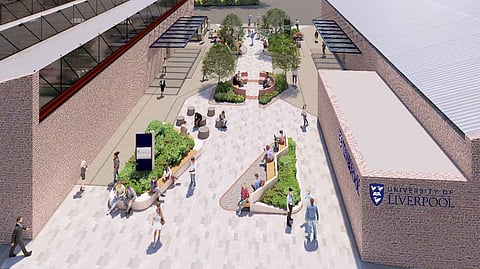

The University of Liverpool has begun admissions for its first India campus, set to open in Alembic City, Bengaluru, in 2026.
The announcement marks the UK institution’s official entry into the Indian higher education landscape. Information on eligibility, programmes and the application process is available on the University of Liverpool India Campus admissions portal.
Designed as a modern learning hub, the Bengaluru campus will feature smart classrooms supporting hands-on learning, case-based discussions and flipped teaching models. Dedicated research spaces, innovation studios and collaborative hubs will enable students to work across disciplines and engage with industry partners.
Specialised laboratories and Bloomberg terminals will give learners access to tools used in global workplaces.
The university aims to create a flexible academic environment that supports diverse learning styles and builds practical, future-ready skills.
The academic offerings will include programmes in Computer Science, Business Management, Accounting and Finance, Biomedical Sciences and Game Design — the latter being a first-of-its-kind course from a UK university’s India campus.
The degrees will follow UK academic standards while being tailored to India’s growing demand for next-generation skills.
Lucy Everest, Chief Operating Officer of the University of Liverpool, visited Mumbai and Bengaluru from November 15 to 19, meeting school leaders, educators and prospective students.
In her keynote address in Mumbai, she highlighted how the Bengaluru campus aligns with India’s National Education Policy (NEP) 2020, which seeks to increase higher education enrolment to 50% by 2035.
She said the India campus embodies the NEP vision of institutions that are globally connected yet locally relevant. Everest also noted that Alembic City provides the ideal setting for the university’s plans in India.
The university plans to build a strong research base in Bengaluru, focusing on sustainability, digital transformation, innovation and health sciences. The goal is to strengthen collaboration among researchers, industry and government.
The new campus will include an integrated “experience zone” — an open hub for students, faculty, industry partners and the community. Modular classrooms will be able to shift quickly between group work and seminar formats, while co-working spaces will support faculty, student teams and entrepreneurs, encouraging direct knowledge exchange.
